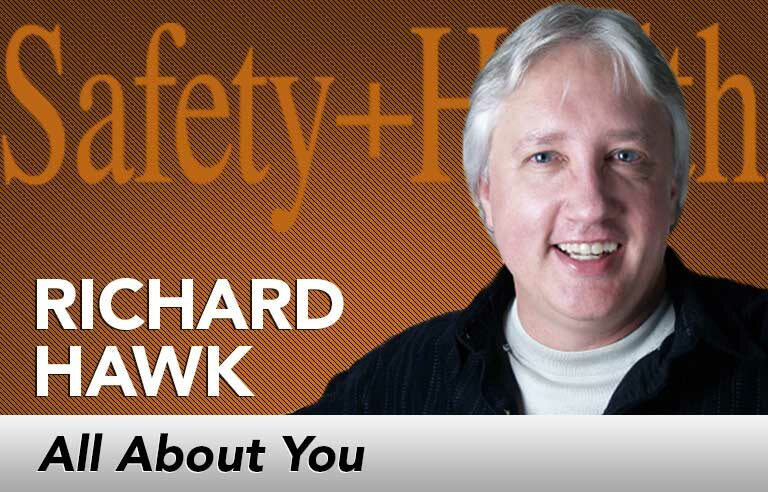All About You: Overcoming ‘imposter syndrome’

EDITOR’S NOTE: Motivating employees to work safely is part of the safety professional’s job. But who motivates the motivator? In this monthly column, veteran safety pro and professional speaker Richard Hawk offers his entertaining brand of wisdom to inspire safety pros to perform at their best.
“No matter what we’ve done, there comes a point where you think, ‘How did I get here? When are they going to discover that I am, in fact, a fraud and take everything away from me?’”
Believe it or not, that’s a quote from actor Tom Hanks during a National Public Radio interview in 2016. Although he has won two Academy Awards and appeared in more than 70 films and TV shows, Hanks said he still doubts his abilities.
Have you ever felt that way – as though you were an imposter at work who, one day, would be found out? If you have, you were experiencing “imposter syndrome,” which is more common than you might think. I was surprised to learn how many books and articles were written on the subject. (Imposter syndrome was first described by psychologists Suzanne Imes and Pauline Rose Clance in the 1970s.)
Surprisingly, imposter syndrome is usually experienced by high achievers, according to psychologists, and can cause anxiety, depression and bouts of low self-esteem.
Getting a new job or taking on a challenging project can trigger imposter syndrome. I’ve experienced it. When I first found out nearly a decade ago that I was chosen to be a featured speaker at NASA’s Johnson Space Center in Houston, I was thrilled. I excitedly told all my friends and family about my “big talk.” I couldn’t wait to get on stage. After a few days had passed, however, I began to experience imposter syndrome. For a while I was afraid that I’d fail because I wasn’t “good enough” to speak at NASA, so I tried a few tactics I’d learned to reduce my anxiety. They may help you, too.
Review your experience. The next time you begin to fall into the clutches of self-doubt, review your experience. It may increase your confidence in your abilities. That helped me feel a lot more comfortable about the NASA gig. By thinking back over my history as a professional speaker and noting the many keynotes I’d given, the Houston talk didn’t seem so formidable.
Even if your work experience doesn’t quite match up with your new endeavor, recalling past successes with other assignments can go a long way toward giving you a boost of confidence.
Ask a trusted friend. If you’re doubting your abilities, ask a longtime, trusted friend who knows you well enough to give an honest appraisal of your talents. Don’t just ask if your friend thinks you can handle the task(s) in question – find out why he or she thinks so.
If your friend points out some areas you need to improve before you take on the new job or project, that’s good. It doesn’t mean you’re not a fit for the challenge; rather, it gives you something to work on that will ensure better results and help eliminate your doubts. Plus, taking action to improve your abilities will occupy your mind and body with something positive.
Appraise yourself, too. Make a list of the skills you have that show you aren’t an imposter. This isn’t a bragging session, but a way for you to see in writing what you have to offer. Show the list to your trusted friend and see what he or she has to say about it. Chances are your friend will boost your confidence by adding skills to the list you hadn’t considered.
Prepare, prepare, prepare. Going on stage without proper preparation can be a nightmare. Yes, I confess there were times years ago when I was too confident in my abilities and didn’t prepare adequately, but I don’t let it happen anymore. Not preparing enough – whether it’s for a safety and health meeting, inspection, or job interview – is a sure way to look and feel like an imposter. Being well prepared, on the other hand, makes you look like the gifted safety and health professional you are.
This article represents the views of the author and should not be construed as a National Safety Council endorsement.
Richard Hawk helps companies around the world create more vibrant safety cultures by showing them how to make safety fun. As a professional speaker, author and musician, he also inspires employees to focus better and enlightens safety leaders about ways to increase their influence. To learn more about Richard, visit makesafetyfun.com.
Direct to your inbox: Sign up to be notified in email about new "All About You" columns.
Listen on Soundcloud or Stitcher
Post a comment to this article
Safety+Health welcomes comments that promote respectful dialogue. Please stay on topic. Comments that contain personal attacks, profanity or abusive language – or those aggressively promoting products or services – will be removed. We reserve the right to determine which comments violate our comment policy. (Anonymous comments are welcome; merely skip the “name” field in the comment box. An email address is required but will not be included with your comment.)

